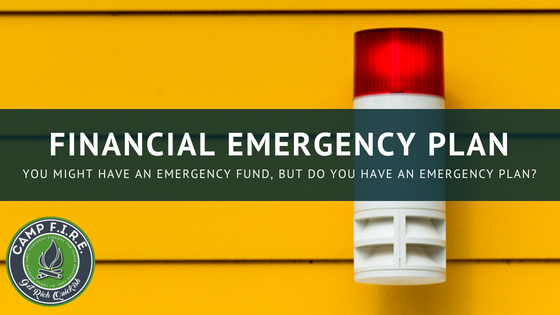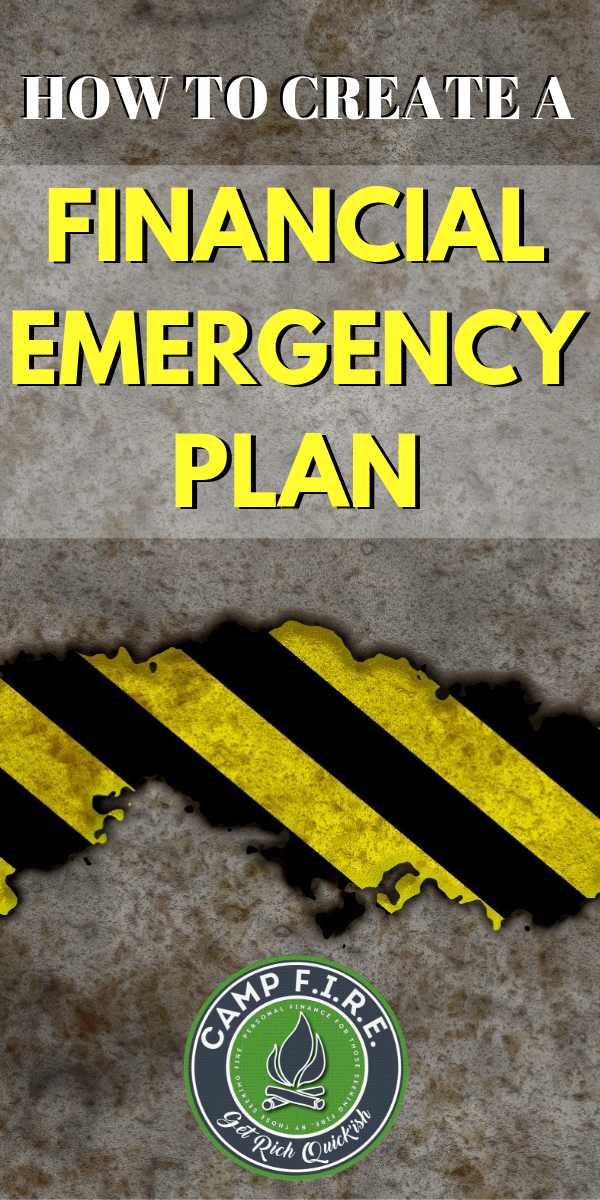
What’s Your Financial Emergency Plan?

Do you have a financial emergency plan? Many people have an emergency fund – but do you have a plan for how you’d handle your money in a financial emergency, like a sudden job loss, were to hit you?
This past Sunday, as I was making the mental transition from relaxing weekend to the start of a new work week, I whipped out my laptop to do a bit of work in preparation for some Monday morning meetings that I had. I didn’t have much work to do and I was cruising along nicely when suddenly I was no longer able to access the files I was working on.
Then over the course of the next several minutes I gradually lost access to to all of my work accounts. No email. VPN access was terminated. My Skype for Business was down. My passwords were being rejected – none of my work credentials were working and I even lost access to email via my phone. Restarting my PC caused me to get locked me out of my machine.
Uh oh – this can’t be good, I thought to myself.
I texted a coworker to see if he was having similar troubles; he wasn’t. Was I suddenly locked out of work because I was going to lose my job in the morning? Such a thing had been known to happen at my place of employment. I wasn’t *too* worried but I have to admit that I had an uneasy feeling.
That uneasy feeling triggered an emotional response and I immediately started to circle my financial wagons. I needed to have a mental game plan ready for what my next steps would be should I get the pink slip the in the morning.
I was now in a defensive mode as I opened up my financial spreadsheet and budget and began to review my Financial Emergency Plan. If I was going to lose my job, here’s what I’d do.
My Financial Emergency Plan
Cash outflow (expenses)
- Cancel all recurring expenses
- Amazon Prime. Is that up for renewal soon? If so, cancel it. (Save $100/yr)
- Comcast – kill the TV package and downgrade the internet package. (Save ~$50/mo)
- Netflix …. keep for now. If finding a new job takes longer than expected, this expense will get cut.
- Cell phones – downgrade to a cheaper rate plan. (Save ~$30/mo)
- Adjust our only two debt payments
- Put the student loan into forbearance. (Save $115/mo)
- Make the normal payment on the car loan. (We currently pay extra each month – save $100/mo)
- If finding a new job takes longer than expected, we’ll look at selling the car and paying cash for a replacement.
- Adjust other recurring expenses
- Shop around for lower rates on renters and auto insurance. (Save ~$20/mo)
- Consider raising insurance deductibles to further lower this monthly expense.
- Other expenses
- Groceries – only the essentials. Hamburger, not steak. Chicken, not salmon. That sort of thing. (Save $50/mo)
- Fast food – Sorry, Ty – no restaurants for you (but that should bring our monthly restaurant bill down quite a bit! – save ~$500/mo)
- Sorry kiddos, gymnastics are temporarily on hold; no swimming lessons either (Save ~$150/mo)
And just like that, in a financial emergency, we could eliminate almost $1,000 per month from flowing out of our bank account.
That’s going to go a long way in helping us manage our finances if and when money gets tight.
Cash Inflow (income & assets)
- Severance pay
- Based on what my previous co-workers have received when they’ve been let go, I think I’d get between 1-3 months of income; possibly more. I’d like to think that I could find a new job within that time frame, but you just never know. I’ve gone over 14 months without a job before. It’s not fun.
- Unemployment insurance
- If I’m still unemployed when my severance runs out, unemployment insurance benefits and income would kick in. These benefits, while less valuable than a full time salary, still provide an income while you’re looking for full time work. These benefits typically last about 26 weeks, or 6.5 months.
- Cash holdings
- This is the first of our assets that we’ll dip into if/when severance and unemployment runs out. Severance pay and unemployment benefits would last me anywhere from 7 to 10 months. If necessary, I’d turn to our cash holdings (a.k.a. our emergency fund). I’d call 10 months of unemployment an emergency worth dipping into the cash for. This would last us another 3-5 months, depending on how much we’d tighten our belt.
- Individual stock
- Once cash runs out, we’ll sell our individual stock to refill our cash holdings. This would buy another half year.
- IRA accounts
- If I’m out of severance, unemployment, cash, and stock then I can turn to my IRA and begin to pull from that. I can access the money I deposited into my ROTH penalty free. I’ve not focused heavily on my IRAs to this point, but there would be enough to cover us for another couple of months.
- 401(k)
- My last line of defense would be tapping into my 401(k). I don’t think it would come to this, but it’s an option nonetheless. If I needed to dip into my 401(k) to survive, then that means I would have been unemployed for about two years. Ouch!
No Sacred Cows
At its core, our plan is really to just white-knuckle every penny we have. Every cent we already have, and everything we get would be fiercely protected. Every dollar spent would be tracked even better that we currently track.
Other options that I’ve not listed here would be selling some of our material possessions that have value. Jewelry, guns, furniture, other collections – nothing would be untouchable if it came right down to it. In fact, I’d probably start to sell things of value before I dipped into our IRA accounts.
Prepare for Unemployment
Nest eggs tend to disappear rather quickly when you are drawing them down, and not adding anything back in.
Between a severance package, unemployment insurance and cash holdings I feel like we’d be just fine for about a year (without really lowering our standard of living). If we really tightened our belts, we could squeeze another two months out of those first three options.
It my situation were to deteriorate to the point where I needed to consider selling our assets, then it’s probably time to start looking internally at myself and asking why I’m having a hard time getting a job.
- Are my jobs skills no longer marketable?
- Do I need to go back to school for training or a certification?
- Are we in the wrong area for the work I’m qualified to do?
- Would I have better luck by moving to a different city or state?
I’d like to think that I could have a new job lined up before my severance package ran out, but in reality finding a new job while your unemployed is a hard thing to do.
Prospective employers tend to look at you and wonder why you’re unemployed; they don’t assume the best. Employers are risk averse and don’t have much of an appetite for taking chances on a job candidate.
If a job came down to me and another candidate, and we were the were the same in every way except for our employment status, more often than not, the gainfully employed candidate will get the nod and the unemployed would remain unemployed.

Crisis Averted
I’m not sure what was wrong with my work credentials this past weekend, but Monday morning came and went and I’m still gainfully employed. All of my tools and credentials are working again. Whatever the problem was, it seems to have been temporary. But having that small scare has motivated me to reexamine my financial emergency plan and to prepare for unemployment.
I’ve also resolved to be better with my professional networking by reaching out to old colleagues. The time to build your network is when you don’t need it. A good book on this subject is called Never Eat Alone – take advantage of every opportunity you have to build and strengthen your professional network.
Related Posts:
- How to Prepare for Unemployment
- How to Prepare for and Survive the Next Recession
- Recession Proofing Your Financial Plan to Ensure Your FIRE Survives the Storm
Chime In!
You might have en emergency fund, but do you have a financial emergency plan?